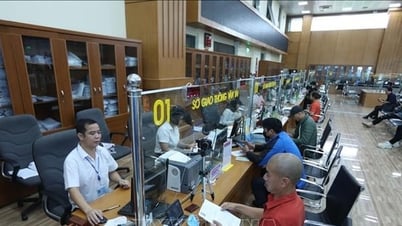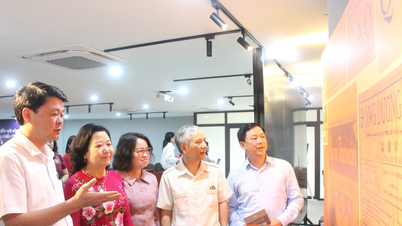
General Secretary To Lam is Head of the Central Steering Committee on perfecting institutions and laws.
This is not only a strategic orientation, but also a profound affirmation of the fundamental role of law in all national reform efforts.
Strategic Platform
In every modern development model, institutions are always considered the decisive factor. In the institutional structure, law plays a central role - a tool to transform policies and guidelines into binding rules of conduct, ensuring fairness, transparency and discipline. However, in Vietnam, a reality that has lasted for many years is that many of the Party's major and correct policies still face difficulties when put into practice due to problems in institutionalization and law enforcement.
Therefore, Resolution 66 has established a new perspective: law is not just an intermediary step, but a bottleneck that needs to be cleared first so that other breakthroughs can be effective. In the context of the country entering a development stage based on science and technology, innovation, digital transformation and deep integration, the creative role of law becomes even more urgent. A modern, feasible and strictly enforced legal system will be a launching pad for national productivity, governance capacity and economic sustainability.
Innovative content with breakthroughs
Resolution 66 sets out many profound reform directions, notably the comprehensive innovation in the way of building and enforcing laws.
First of all, it is necessary to innovate legislative thinking – shifting from management thinking to creative thinking. Law is no longer just a tool to regulate behavior, but must become a driving force for development. Therefore, each law must be viewed as a component of the national development strategy, instead of just solving immediate problems or being reactive.

A modern, feasible and transparent legal system will be a particularly important development advantage.
Second, the Resolution emphasizes the building of a culture of legal compliance and strengthening post-auditing. This is a transition from a legal system based on administrative orders to a governance system based on the rule of law. A culture of compliance cannot be formed if the law is still confusing, overlapping, and lacking in transparency. Therefore, the Resolution requires regular assessment of the effectiveness of laws after promulgation, taking the results of implementation as a measure of legal quality.
Third, Resolution 66 particularly emphasizes the investment of resources in law-making and law enforcement. For the first time, a Central Resolution clearly identifies law as an area that requires focused investment, and cannot be done in a half-hearted manner. Resources here include: human resources (professional legal staff, knowledgeable about both policies and legislative techniques); financial resources (budget for impact assessment, criticism, post-audit); technology (application of artificial intelligence, big data in law-making and law enforcement); and institutional organization (improving legal departments, establishing consulting centers, etc.).
Fourth, a notable new point is the establishment of the Central Steering Committee for Institutional and Legal Improvement – comprising almost all members of the Government and Chairmen of the National Assembly’s committees. This is a strong inter-sectoral coordination institution that can significantly shorten institutional lags, enhance accountability and ensure consistency between legislation, execution and supervision. International experience shows that countries that have been successful in institutional reform such as Korea or France have established similar central agencies – where institutional thinking is innovated, policies are integrated and laws are shaped from a development vision.
Ultimately, Resolution 66 sets out the goal of building a legal ecosystem that is people- and business-centric. Laws must be easy to understand, easy to access, and easy to comply with. To do so, legal language needs to be simplified, legal procedures need to be strongly digitized, and legal support services need to be widely available – especially to vulnerable groups.
Conditions for realization
To realize the orientations in Resolution 66, it is necessary to start by standardizing the entire legislative process: from policy making, drafting, consultation, review, promulgation to monitoring implementation. Each step must have clear standards, specific coordination mechanisms and transparent accountability.

Resolution 66 is not only a legislative technical orientation, but also a strategic blueprint to restructure the national institutional foundation - a launching pad for the country to enter an era of development, civilization and prosperity.
Along with that is the need to improve the capacity of the legal team – not only in the legislative body, but also in the executive and judicial systems. Vietnam needs a long-term strategy to professionalize the “law-making profession”, while expanding the mechanism to attract intellectuals, scientists and research organizations to participate in policy criticism from the beginning.
In addition, investment in technology and digital data for legal work is an inevitable requirement. A modern legal system cannot rely on manual processes. Electronic legal code systems, software to support law drafting, and real-time law enforcement monitoring tools need to be built synchronously.
Finally, it is necessary to establish an independent monitoring mechanism for the effectiveness of laws after they are enacted. The National Assembly can establish specialized monitoring groups, while social organizations, the press, and academia should be encouraged to participate in the post-legislative review process. A strong legal system is one that is capable of self-illumination, self-adjustment, and evolution according to practice.
Launch pad for the development era
Resolution 66 is not only a legislative technical orientation, but also a strategic blueprint to restructure the national institutional foundation – a launching pad for the country to enter an era of development, civilization and prosperity. In the 21st century – where competition between nations is no longer just about resources or labor, but about institutions and governance quality – a modern, feasible and transparent legal system will be a particularly important development advantage.
When the law becomes the "breakthrough of breakthroughs", that is also when the State truly becomes a rule-of-law State and society must always be disciplined, creative and develop sustainably.
Dr. Nguyen Si Dung
Source: https://baochinhphu.vn/doi-moi-toan-dien-ve-cach-xay-dung-va-thuc-thi-phap-luat-trong-ky-nguyen-moi-102250503064604391.htm





![[Photo] Thousands of Buddhists wait to worship Buddha's relics in Binh Chanh district](https://vphoto.vietnam.vn/thumb/1200x675/vietnam/resource/IMAGE/2025/5/3/e25a3fc76a6b41a5ac5ddb93627f4a7a)






















































































Comment (0)